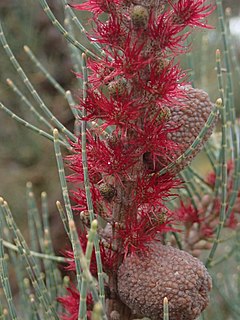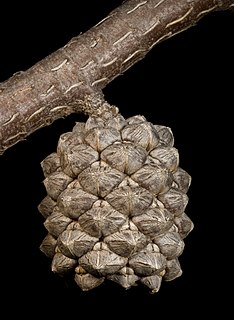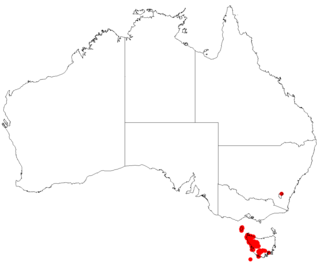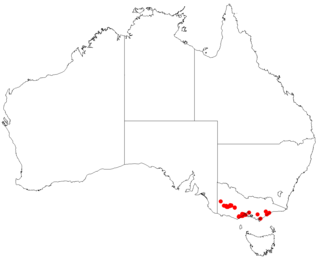
Allocasuarina is a genus of trees in the flowering plant family Casuarinaceae. They are endemic to Australia, occurring primarily in the south. Like the closely related genus Casuarina, they are commonly called sheoaks or she-oaks.

Allocasuarina fraseriana, commonly known as western sheoak, common sheoak, WA sheoak. Fraser's sheoak or just sheoak, is a tree in the family Casuarinaceae. Endemic to Western Australia, it occurs near the coast in the south west corner of the State, from Jurien to Albany . The Noongar peoples know the tree as Condil, Kulli or Gulli.

Allocasuarina huegeliana, commonly known as rock sheoak or sighing sheoak, is a tree in the family Casuarinaceae. Endemic to Western Australia, it occurs mostly throughout the Wheatbelt region. It is now especially common on road verges, where it sometimes forms thickets.

Allocasuarina humilis, commonly known as the dwarf sheoak or dwarf casuarina, is a woody shrub of the family Casuarinaceae endemic to the south-west of Western Australia.

Allocasuarina distyla, commonly known as scrub she-oak, is a shrub or small tree of the She-oak family Casuarinaceae endemic to New South Wales.

Allocasuarina verticillata, commonly known as drooping she-oak or drooping sheoak, is a nitrogen fixing native tree of southeastern Australia.

Allocasuarina crassa, commonly known as the Cape Pillar sheoak, is a species of sheoak native to Tasmania, Australia.

Allocasuarina inophloia, also known as woolly oak, or stringybark she-oak, is a shrub or small tree of the she-oak family Casuarinaceae endemic to inland New South Wales and Queensland. The hairy bark is an unusual feature.

Allocasuarina corniculata, commonly known as Tamma or the Tamma sheoak, is a shrub of the genus Allocasuarina native to the Wheatbelt and Goldfields-Esperance regions of Western Australia.

Allocasuarina dielsiana, commonly known as the Northern sheoak, is a tree of the genus Allocasuarina native to the Mid West and Goldfields-Esperance regions of Western Australia.

Allocasuarina drummondiana is a shrub of the genus Allocasuarina native to the Wheatbelt region of Western Australia.
Allocasuarina fibrosa, commonly known as the woolly sheoak, is a shrub of the genus Allocasuarina native to a small area in the central Wheatbelt region of Western Australia.

Allocasuarina diminuta, commonly known as the broombush sheoak, is a shrub of the genus Allocasuarina native to an area in eastern New South Wales.

Sheoak Hill Conservation Park is a protected area in the Australian state of South Australia located on the Eyre Peninsula in the gazetted locality of Miltalie about 35 kilometres (22 mi) north-west of Cowell.

Allocasuarina monilifera, commonly known as necklace sheoak, is a shrub of the genus Allocasuarina native to Tasmania and Victoria.

Allocasuarina duncanii, commonly known as Duncan's sheoak, is a small tree of the genus Allocasuarina native to Tasmania.

Allocasuarina zephyrea, commonly known as the western scrub sheoak, is a shrub of the genus Allocasuarina native to Tasmania.
Allocasuarina emuina, commonly known as the Emu Mountain sheoak, is a shrub of the genus Allocasuarina native to Queensland.
Allocasuarina filidens, commonly known as the Mount Beerwah sheoak, is a shrub of the genus Allocasuarina native to Queensland.

Allocasuarina misera, commonly known as the small sheoak or the slender sheoak, is a species of the Allocasuarina genu native to Australia.

















